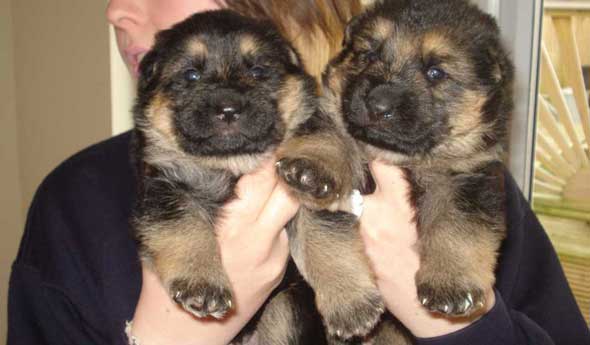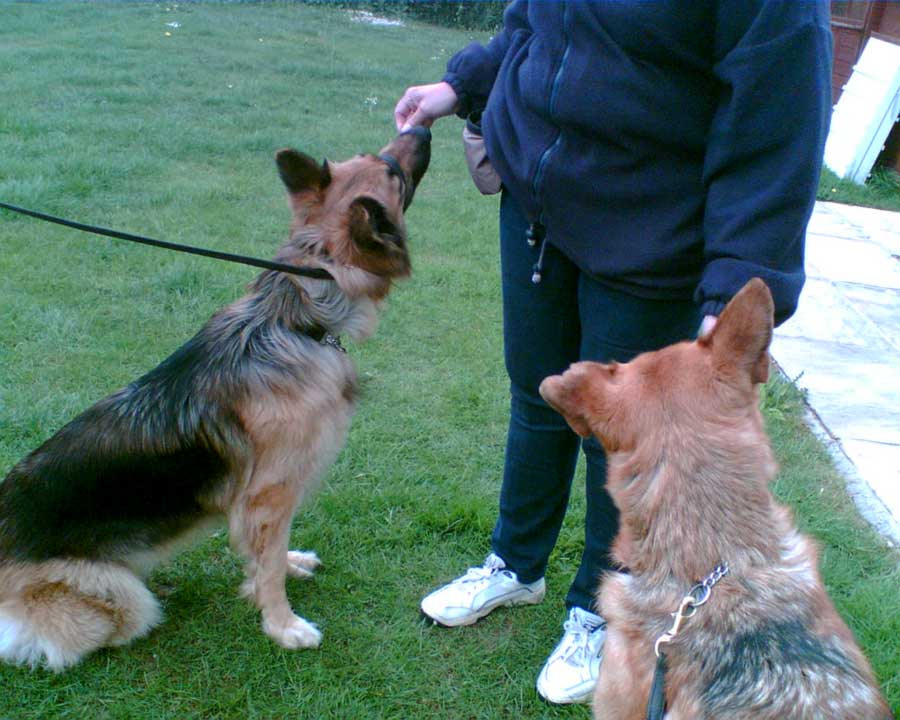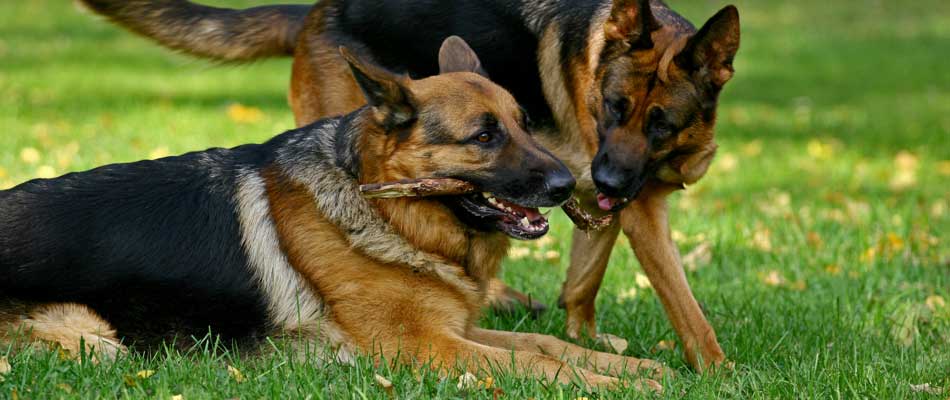German Shepherds - General Advice
Pedigree, crossbreed, puppy or adult dog, maybe you are considering giving a rescue dog a forever home. Whichever you choose, make sure you do your research to make sure the dog will fit in to your life style. For example the size of your house and garden, how much exercise it will need, will it be good around children etc. and most importantly, do you have the time to train the dog to be a confident well-behaved member of your family.
Choosing Your Puppy
If you decide on a pedigree dog, The Kennel Club will supply you with a list of reputable breeders. When the day arrives to choose your puppy, don’t let sentiment rule your decision, the cute puppy cowering in the corner could possibly go on to have a nervous disposition which may give rise to behavioural issues later, the most outgoing puppy should also be avoided especially if this is your first dog, it might look like a bundle of fun but without the correct handling and training it could grow to be a demanding and perhaps a dominating adult dog.
Look for a puppy who is happy to accept your attention but is equally just as happy to play contentedly with its litter-mates. A word of warning, have plenty of spare shoe laces handy! You may be thinking of giving a rescue dog a home. If so then try to get as much information as possible about its past life, visit it as often as you can and ask if you can walk/play with the dog, rescue centres usually have a safe exercise compound. It is also vital that all family members visit the dog so that you will be able to judge the suitability of it for your needs.

We strongly recommend the use of a crate for your new arrival, it will provide a safe and secure den for pup where it can be left to rest peacefully and cannot get into mischief when left alone. Remember that if you have children they should be taught how to interact calmly with the puppy and not over excite it, the crate acts as the perfect time out area – it’s your choice whether you put puppy in or the children!
First Days with your New Puppy
Pup will inevitably cry for the first few nights unless you are really lucky. Resist the urge to go to them, yes we know it’s hard, but this will merely tell it that if it cries or barks it will get attention. A ticking clock nearby to the crate replicates a mother's heartbeat and may calm pup.
Toilet training, if done consistently can be achieved very quickly. Keep in mind the times a puppy is most likely to need to relieve itself, these are immediately on waking up, after eating and after a bit of play, so always be vigilant in taking puppy outside straight after any of these times and waiting with pup until it has toileted then immediately praise and treat the puppy.
If puppy wets or messes indoors do not punish it, if you catch pup in the act scoop it up and place it outside.
Puppies are chewers but this need not be a problem, firstly make sure pup has plenty of things to chew on, stag horns which are available from pet shops or online are ideal if a little pricey but they last a long time. If pup is hanging onto your ankle give out a high pitched squeal, this is the reaction of puppies playing together in the litter during the early days, usually the pup will let go.
If you don’t want puppy to chew your best shoes or your slippers, the easy solution is don’t leave them where pup can get them!
Training Your German Shepherd

Remember that puppies do not stay small for long, if you don’t want a fully grown dog climbing onto your best sofa don’t allow your puppy to do it. If you do find pup sitting in your favourite chair, the command is OFF not DOWN. 'Down' is used to get the dog to lay down.
Training begins from the first day you take your puppy home, the earlier you start the easier it will be to avoid both you and the puppy falling into bad habits but don’t overdo it, five minutes a couple of times a day in the beginning is fine but you can also make it a part of every-day life. For instance making the puppy wait for a couple of seconds when you place the food bowl down, everytime pup goes into the crate whether you place pup there or it goes in freely say “bed”. You can encourage puppy into the crate with the lure of a small treat or by tossing a toy in.
If you hold a small treat just above the dog's nose it will look up and usually park its bottom on the floor, after a few times of doing this you can add the word SIT to the action but this must be said immediately pup’s bottom touches the floor.
Of course the ideal solution is to enrol in puppy classes with the Aylesbury German Shepherd Dog Training Club but whether you decide to join us or another club, the earlier you start lessons the better.
